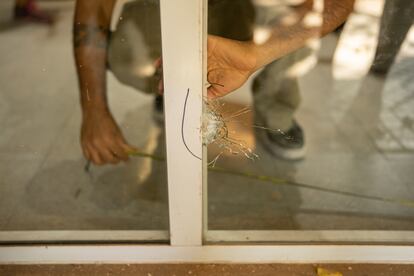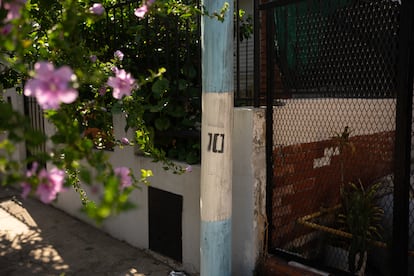Supermarket shooting leaves Messi’s dream of returning to Rosario in the air
Bullets fired at a store owned by the Roccuzzo family have brought Argentina’s most violent city to international attention. The Argentina captain has often said he would like to end his career at Newell’s

Overnight on Wednesday there were several shoot-outs in Rosario, as there were on Tuesday and on Monday. Gunshots can be heard practically every day in Argentina’s most violent city, where 56 homicides have been recorded so far this year. On Wednesday, 14 shots being fired at a supermarket would probably have passed unnoticed in the middle of a turf war between drug gangs raging on Rosario’s streets. But a single piece of paper ensured the incident would gain international attention: “Messi, we are waiting for you. [The mayor, Pablo] Javkin is a drug dealer, he will not keep you safe,” read a threat left by the assailants. Suddenly, the violence in Rosario had spilled over into the private life of the city’s most famous son, Lionel Messi, captain of the Argentina national soccer team. The supermarket targeted in the attack belongs to the family of Antonela Roccuzzo, Messi’s wife.
The 14 bullets fired into the shuttered windows of the store did not cause any fatalities, but they may have served to kill the dream of many Rosario residents to see Messi return to his hometown to play for Newell’s Old Boys, the team he left at the age of the 13 to join FC Barcelona. The careful choice of target, a supermarket owned by Messi’s father-in-law, José Roccuzzo, also shattered the anonymity in which the player’s parents and those of his wife move around the city, while placing the escalating insecurity crisis on the front pages of the world’s media.
“The only thing that’s different about this attack and the others we see every day is that it says “Messi.” But they’ve stepped on an anthill, because since it is Messi, it will not go unpunished like many others,” says Esther Marín, standing outside the gates of the governor’s office in Rosario. She says that her son, Lautaro Aranda, was killed in 2021 “by mistake, at the house of a relative who a narco hitman was looking to kill.”
Standing next to Marin is Elisabeth Luna, who lost her 27-year-old son, her daughter-in-law, and her six-year-old granddaughter in a shooting in the La Tablada neighborhood. The child was shot six times. “The violence is out of control. We live in fear. Last week, I went out at midday to do some paperwork and I was attacked by two people on a motorcycle. They grabbed me, kicked me, and took my bag with everything in it,” says Luna, who lives only seven blocks away from the Roccuzzo supermarket. “It doesn’t matter who you are, it can happen to any one of us,” adds Luna, who is a member of the Victims and Relatives of Insecurity organization, whose members mobilized on Thursday to demand urgent measures from the government against a problem that is becoming worse by the day: in 2022, there were 288 murders recorded in Rosario, a record number.

The bullets of organized crime have hit offices of the judiciary, police stations and the residences of politicians and judges. But nobody imagined they would ever reach the family of the player who led Argentina to a World Cup title in Qatar last year after a 36-year wait.
Messi responded through his father and representative, Jorge Messi. “I talked to the kid and he told me to ‘stay calm,” the player’s father said, as reported by La Nación. Jorge Messi added the attack will not affect the family’s connection with Rosario and that they will continue to travel there as they usually do for Christmas and New Year celebrations. “We’ve never used bodyguards, we lead a normal life,” Messi’s mother, Celia Cuccittini, told Argentinean television show Intrusos.
In front of the supermarket owned by Messi’s in-laws, residents say that Antonela’s father is also a regular guy. “José comes in every day, he’s like any other worker,” says the owner of a warehouse on the other side of the street. “They’re great people,” says María Teresa, who owns a shop next to the supermarket that sells diapers. “The family has been here all their lives, three generations. The grandmother started it, it was a small shop and with hard work they built it up.”
On the morning after the shooting, residents and store keepers looked on in surprise as the police arrived at the supermarket. They told reporters that they had never expected anything like this. But the daily coexistence of Rosario’s inhabitants with violence meant interest was short-lived. By 12pm on Thursday, the broken windows had been replaced and the supermarket was open for business as usual, along with all the others.

Messi’s Newell’s dream
Neither the mayor of Rosario, Pablo Javkin, the police, the prosecutor’s office or anyone else has yet provided an answer to the most-asked and most obvious question: who would want to attack Messi’s family and threaten him, and why?
“It’s such [a] vicious [attack] that I question everything. Even that [it was done by] criminal gangs,” said Javkin. “It is very clear that it is easy to harm Rosario and that there is no concrete help. How far away is the president from here, half an hour away? I am the mayor of the city, I do not manage the security forces, and when I [have] asked [to do it], they have not let me.”
The security forces in Rosario are insufficient to combat the growing presence of the drug gangs in the city and the Provincial authorities have on previous occasions asked the national government to send federal forces to curb the spike in crime. But there is a wider problem: among the law enforcement the city does have there are those who work with the gangs. The latest case became known this week when a 23-year-old man was arrested along with his mother, a police officer: he was a hitman and she passed him information from the 12th precinct that he used to locate his victims.

A lack of official answers has opened the way for debate and the exchange of hypotheses in the cafés and bars of Argentina’s second city. Some believe there are political motives behind the attack, spurred by the proximity of October’s general elections. Others believe the backdrop is an ongoing battle between Javkin and the police. A third option, naturally, centers on soccer.
“Look, the paper was yellow and it was written in blue ink; those are the colors of [Newell’s local rivals Rosario] Central. It was made by their supporters so that he wouldn’t come play for Newell’s,” one man opines to another in the square in front of the regional government building.
Messi has often said he would like to end his playing career where he started it, at Newell’s. “Antonela and me talk about it all the time. We have everything there, my family and her hers. I didn’t live in Argentina for long, I left when I was 13. I’d like to play in Argentina and at Newell’s, which is where I grew up. It was my dream as a kid,” Messi said during an interview with Argentinean television a while ago.
Sign up for our weekly newsletter to get more English-language news coverage from EL PAÍS USA Edition
Tu suscripción se está usando en otro dispositivo
¿Quieres añadir otro usuario a tu suscripción?
Si continúas leyendo en este dispositivo, no se podrá leer en el otro.
FlechaTu suscripción se está usando en otro dispositivo y solo puedes acceder a EL PAÍS desde un dispositivo a la vez.
Si quieres compartir tu cuenta, cambia tu suscripción a la modalidad Premium, así podrás añadir otro usuario. Cada uno accederá con su propia cuenta de email, lo que os permitirá personalizar vuestra experiencia en EL PAÍS.
¿Tienes una suscripción de empresa? Accede aquí para contratar más cuentas.
En el caso de no saber quién está usando tu cuenta, te recomendamos cambiar tu contraseña aquí.
Si decides continuar compartiendo tu cuenta, este mensaje se mostrará en tu dispositivo y en el de la otra persona que está usando tu cuenta de forma indefinida, afectando a tu experiencia de lectura. Puedes consultar aquí los términos y condiciones de la suscripción digital.









































